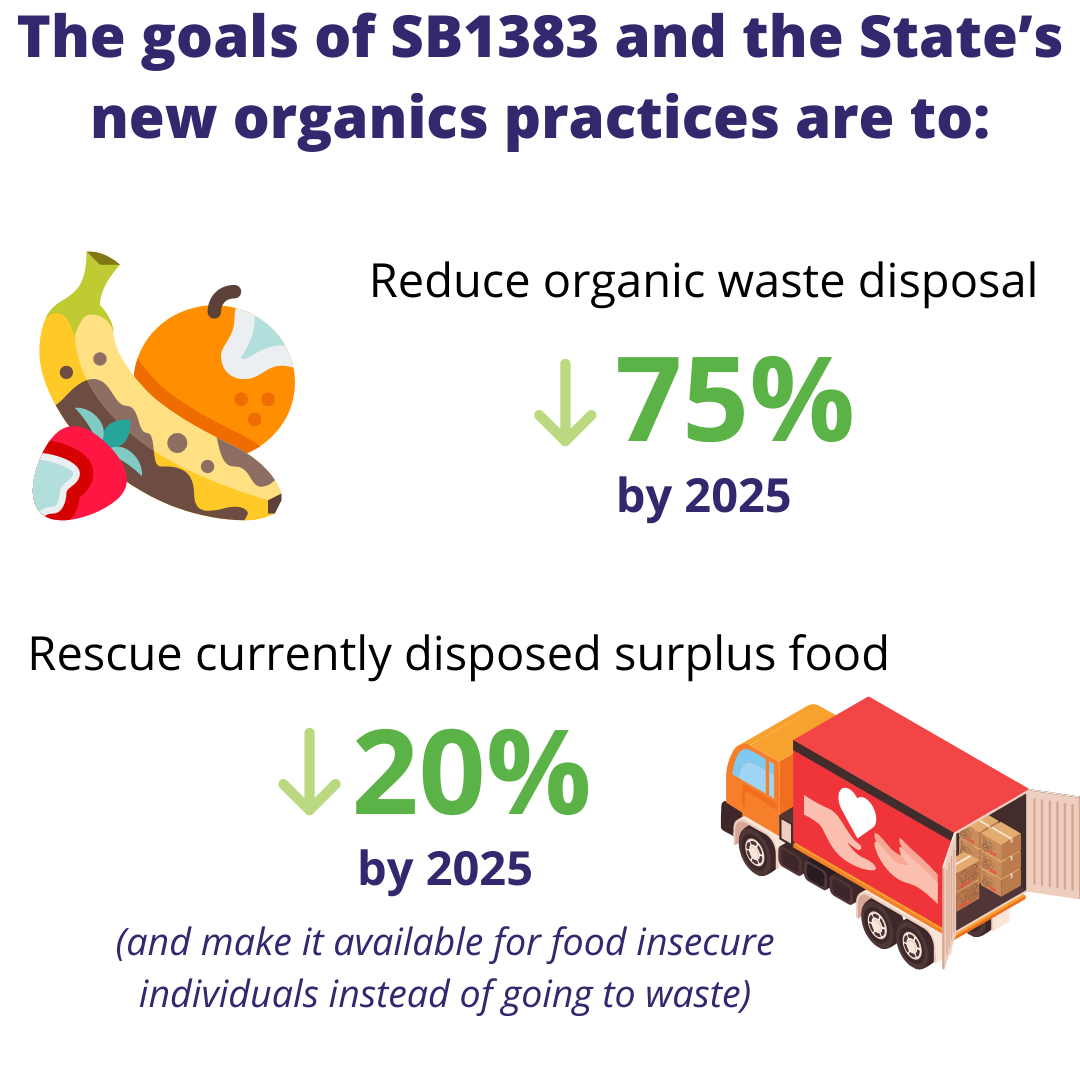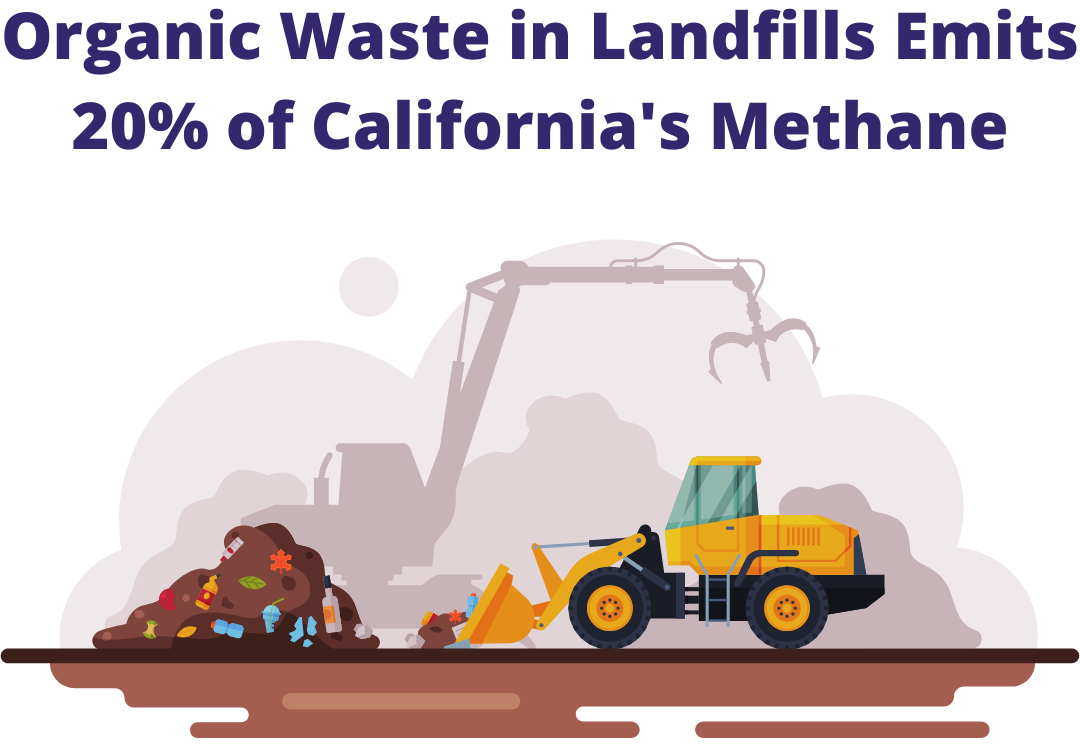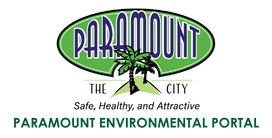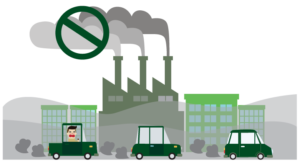 Residents across California will soon see changes to the way organic waste, such as food scraps and yard trimmings, is disposed of and recycled. SB1383, a statewide effort to reduce emissions of short-lived climate pollutants, will require all California cities, including Paramount, to reduce organic material waste and rescue surplus food sources from commercial establishments to feed Californians facing food insecurity (instead of letting them go to waste).
Residents across California will soon see changes to the way organic waste, such as food scraps and yard trimmings, is disposed of and recycled. SB1383, a statewide effort to reduce emissions of short-lived climate pollutants, will require all California cities, including Paramount, to reduce organic material waste and rescue surplus food sources from commercial establishments to feed Californians facing food insecurity (instead of letting them go to waste).
This means there will be some changes in how we ask our residents to sort their organic waste, and in how our City’s waste hauler, Athens Services, collects and processes organic materials. During this period of transition, we appreciate our community’s cooperation and dedication to our City’s goal of creating a more sustainable future for generations to come.
What does this mean for you?
The City of Paramount is partnering with our waste hauler, Athens Services, which will provide safe and reliable curbside collection services for residents and businesses, including you! Once the organics waste collection program is debuted, you will simply dispose of your organic waste in your existing green waste bin. The City and Athens Services will soon distribute more information on how to properly identify and dispose of organic waste.
Help Paramount Be the Change!
 When organic compostable materials such as food scraps, yard trimmings, and paper break down in a landfill, they contribute to greenhouse gas emissions. Because these materials decompose anaerobically (without oxygen) in a landfill, they produce methane, which is one of the most potent greenhouse gases in the atmosphere and a major contributor to climate change.
When organic compostable materials such as food scraps, yard trimmings, and paper break down in a landfill, they contribute to greenhouse gas emissions. Because these materials decompose anaerobically (without oxygen) in a landfill, they produce methane, which is one of the most potent greenhouse gases in the atmosphere and a major contributor to climate change.
In an effort to protect the environment and reduce carbon emissions, the State is requiring cities, like Paramount, to increase the diversion of organic materials from landfills and toward the production of value-added products such as fertilizers, compost, and biofuels. The simplest way to accomplish this is to separate out organic waste from the rest of our trash, the same way we do with recyclable materials. This allows our waste hauler to repurpose these materials into mulch, compost, healthy soil, and other materials that help, not harm, our environment.
You can help California meet these goals by:
- Setting up a home compost system
- Recycling
- Using worms to compost
- Use compost and mulch produced in California to sequester, or reuse, carbon in the soil – giving your organic waste a second life and purpose.
Food Recovery
Reduce food waste and help address food insecurity by redirecting your resources to one of the City’s food recovery organizations:
- Emmanuel Church
- Paramount Community Church
- Paramount Care Foundation
FAQ
The enforcement provisions in SB 1383 will assist jurisdictions, non-local entities, local education districts, state, federal facilities, and CalRecycle to achieve the state’s climate goals and the 75 percent organic waste diversion goal by 2025 and into the future. More information on enforcement rollout are forthcoming.
SB 1383 is a mandate of the State of California and there is no available funding at this time to assist Cities in implementing the program. Paramount is working with its trash hauler, Athens, to explore cost-effective options for rolling out this program. Stay tuned as more information becomes available in 2023.
The City of Paramount has provided kitchen pails to single family residents to facilitate the implementation of this program and will continue to provide resources to all residents and businesses.
Starting in 2022, all jurisdictions will need to provide organic waste collection services to all residents and businesses and facilitate the recycling of these organic materials through their hauler.
Yes! This is a new system similar to how your trash is picked up now. Everyone will need to participate and properly sort discarded materials into the correct bins or receptacles provided.
If you choose not to participate, you may receive a fine similar to if you don’t dispose of your regular trash properly.
The enforcement provisions in SB 1383 will assist jurisdictions, non-local entities, local education districts, state, federal facilities, and CalRecycle to achieve the state’s climate goals and the 75 percent organic waste diversion goal by 2025 and into the future. More information on enforcement rollout are forthcoming.
Recovered surplus edible food will be donated to food banks, homeless shelters, and other organizations for those who are food insecure. Starting in 2022, food service businesses must donate edible food to food recovery organizations. This will help feed the almost 1 in 4 Californians without enough to eat. California has a 2025 goal to redirect to people in need 20% of edible food currently thrown away.
As California collects and recycles organic materials, local governments will be required to use the products made from this recycled organic material, such as renewable energy, compost, and mulch.
For example, organic waste will be used to curate healthy soil! Compost is a key to healthy soil, and healthy soil is critical to reducing carbon in the air.
Residents – What are my responsibilities as a resident?
- Residents will simply dispose of organic/compostable waste in your existing green waste bin. Multi-family housing units that utilize community trash bins will also begin receiving community organics carts.
- Investing in a kitchen trash bin used specifically for organics is recommended and will make this process easy.
Businesses – What are my responsibilities as a business?
- Any business with 2 cubic yards of trash or more weekly is required to recycle organics and food waste.
- Food service businesses must donate edible food to food recovery organizations with others starting in 2024. This will help feed the almost 1 in 4 Californians without enough to eat.
- California has a goal to redirect 20% of edible food currently thrown away to people in need by 2025.
Self-Haulers (contractors, construction workers, landscapers, etc.) – What are my responsibilities as a self-hauler?
- Self-haulers will need to ensure all organic compostable materials — such as hedge and tree trimmings, cardboards, wood scraps, etc. — are separated from landfill materials and properly disposed of.
Commercial
The Athens Organic Waste Recycling program is currently in place. Businesses must start separating organic waste from their trash immediately and should contact Athens to update their account.
Residential
The Athens Organic Waste Recycling program is currently in place. Learn more in this video from Athens.
Everybody, including you! If you live, work, or own property in the State of California, you will need to take part in these new processes.
A focus on recycling organic materials is central to California’s efforts to combat climate change. California has been experiencing the effects of a climate crisis: hotter summers, extreme temperatures, an increase in wildfires, extreme droughts, and rising sea levels that erode our coastlines. Research has taught us that greenhouse gases released by human activities, such as landfilling food and yard waste, contribute to climate change. To respond to this climate crisis, California is implementing statewide organic waste recycling and surplus food recovery.
- Grass clippings
- Leaves and branches
- Flower and hedge trimmings
- Weeds
- Lumber, scrap wood and plywood (not painted or treated)
- Fruits and vegetables
- Cheese and dairy
- Meat, bones, poultry and seafood
- Bread, rice and pasta
- Cut flowers and herbs
- Coffee filters
- Any putrescible matter produced from human or animal food production, preparation, and consumption activities
- Food-stained paper
- Napkins and paper kitchen towels
- Paper egg cartons
- Paper food boats (no plastic lining)
- Paper packaging
- Paper plates and cups (no plastic lining)
- Pizza boxes
- 100% fiber based, compostable serving-ware and to-go containers
Organic waste is any material that is biodegradable and comes from either a plant or an animal. Biodegradable waste is organic material that can be broken into carbon dioxide, methane, or simple organic molecules.

